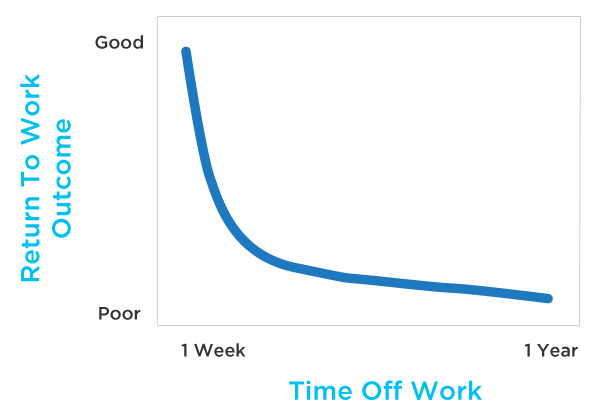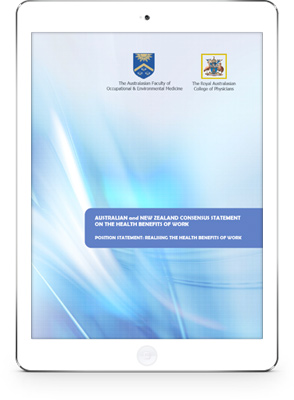Essential Knowledge About Pain
“Returning to work is a helpful part of my recovery”
Important Fact:
For most musculoskeletal problems, like strains and sprains, the longer you are out of work the poorer your outcome is likely to be. This has been shown in injury data time and time again. Generally, around three months is a tipping point. This is illustrated in the ‘Exponential’ Graph For Work Injury Recovery. After about 3 months of being out of work, there is high risk of poor outcome, meaning it can be much more difficult to get back to work.
This is why there is usually a focus on getting you back to work as soon as possible after an injury. This may have to be in an alternate role as you rebuild work capacity after an injury. Ideally your health care providers will provide detail on your capacity to work, and your employer will find tasks for you to perform within your capacity. Sometimes an employer may not be able to provide alternate duties. In these circumstances other options are available, such as work trials/hardening programs with other employers.

The ‘Exponential’ Graph For Work Injury Recovery
Important Fact:
You don’t need to be pain free to return to work. Most people experience some pain on a day to day basis, but manage to be productive workers. A large proportion of injured workers return to work still having some level of pain. This will vary on an individual basis. For more information of why you can work with some pain, see the information in “My pain does not equal damage” section of this web-site. Your health care professional team can help you determine how your pain may relate to your ability to return to work.
Important Fact:
Without doubt, GOOD work is good for your health.
Benefits of being at work with work related-pain:
- You feel valued
- Your self worth is increased
- You can stay active and engaged
- You can stay in touch with your work colleagues and work-related social networks
- You recover faster compared with people who stay at home, rest and are disengaged with their workplace
General health benefits of work (compared to those who do not work):
- Better general health and reduced illness
- Better physical health
- Better mental health
- Reduced use of medical services
- Live longer
Australian and New Zealand consensus statement on the health benefits of work
Important Considerations: There are some occasions when time off work is necessary for a defined period of time. A good example may be after surgery when a period of recovery may be necessary before returning to work. I these cases you should discuss this with your doctor and employer and try and agree on a timeframe for your return to work.
Summary: Return to work helps recovery
Work is good for your health. The longer you are out of work with an injury, the poorer the outcomes can be. Three months out of work is an important tipping point. Getting back to work as soon as you can, within your capacity, should be viewed not just as the outcome, but as a vital part of your treatment as well.
Evidence Informed Information Compiled By Dr Darren Beales, PhD and Dr Tim Mitchell, PhD












